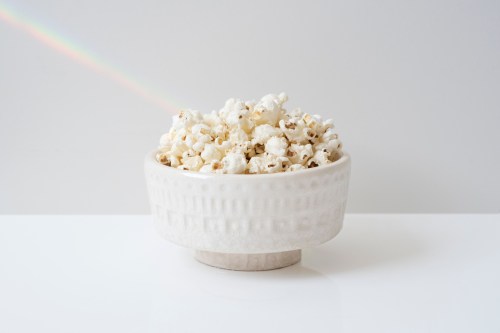Our editors independently select these products. Making a purchase through our links may earn Well+Good a commission
5 Brain-Stimulating ‘Sensory Snacks’ That Can Help You Stay Focused and Productive, Says a Psychiatrist
Discover a psychiatrist with ADHD’s favorite (two-ingredient!) stimulating sensory snack for waking up the brain and promoting attention.

Snap! Crackle! Pop! There’s no denying that many of us are instantly drawn by the crunch and textures of certain foods. Hellooo, Cooler Ranch Doritos.
Experts in This Article
a board-certified psychiatrist and ADHD clinical specialist
Aside from the fun chomping sound emitted when chomping on these crispy-crunchy foods, researchers say snacking on foods that are texturally-complex and/or have nuanced flavor (especially spice) is a smart way to stimulate brain activity. These “sensory snacks” figuratively tickle someone’s taste buds in a way that can activate their brain receptors, which can be a helpful concentration tool. And according to a gastrophysicist and psychiatrist, our brains often correlate crunchiness with markers of freshness, too.
Ahead, a board-certified psychiatrist delves into how sensory snacks can help boost concentration and brain functioning by stimulating brain activity. Plus: The expert’s own studied sensory snack she calls on when she needs to wake up her brain with a “focus crunch.”
Health benefits of sensory snacking
In a recent Instagram post, board-certified psychiatrist and ADHD clinical specialist Sasha Hamdani, MD shares that noshing on a crunchy, tasty snack is one of the easiest (and tastiest) ways to stimulate the brain. Then she shows how to make one of her go-to sensory concoctions: pickle popcorn made from microwaved popcorn tossed with dill pickle-flavored cashews. While some may find this combination rather surprising, Dr. Hamdani says that’s exactly the point.
Dr. Hamdani came up with the creative combination based on her personal experience with ADHD and what’s worked best for her in the past. “I have ADHD myself, so I came about this snack when I was thinking about how I sustain myself,” Dr. Hamdani says. “People with ADHD are often searching for stimulation, whether intentional or unintentional.”
“I have ADHD myself, so I came about this snack when I was thinking about how I sustain myself,” Dr. Hamdani says. “People with ADHD are often searching for stimulation, whether intentional or unintentional.”
In the case of pickle popcorn, she found that it was an easy, intentional way to stimulate her brain and stay on track during her daily activities. “I’ve found that when you eat certain foods, sometimes you can get a certain amount of stimulation from the food itself, which keeps you engaged and focused on attending to the tasks you’re doing,” Dr. Hamdani adds.
How to make the perfect sensory snack
While there are no hard-and-fast rules for designing your own sensory snack recipe, there are a few key factors that can help make yours as stimulating as possible. First and foremost, Dr. Hamdani says it ultimately comes down to personal preference. “It’s highly dependent on the person’s palate,” she says.
However, despite this, Dr. Hamdani says you want to look for foods that will be as interesting to the mouth as possible. Think: Spicy, crunchy, sour things. “For example, when you need something to push you away from a panic attack, we recommend something to distract you from that moment, like super sour candy,” she says.
All to say: If pickle popcorn isn’t your cup of tea, don’t worry. Dr. Hamdani says other sensory snacks like spiced nuts, spicy mango, and frozen grapes (which she then coats with fresh lemon or lime juice for added zip) will also do the trick. And ultimately, it all comes down to finding something that your brain truly enjoys.
Dr. Hamdani says other sensory snacks like spiced nuts, spicy mango, and frozen grapes (which she then coats with fresh lemon or lime juice for added zip) will also do the trick.
When to eat your sensory snack
In terms of timing, Dr. Hamdani says it’s important to understand your natural patterns. “I eat it when I know I’m slumping, or around two in the afternoon, when I could use that kind of stimulating snack,” she says, adding that sensory snacks are especially necessary on weekends when she doesn’t have as much of a set schedule (and needs something to help her stay on track).
Seafood is excellent for brain health, too
Dr. Hamdani concludes by sharing that seafood is another all-star dish for cognitive functioning. According to her, certain types of fish (like salmon) are packed with omega-3 fatty acids, which are highly beneficial for brain health. “Omega-3 fatty acids are important from a neurobiological perspective because they help build up that fatty layer of the myelin sheath, which surrounds neurons that help chemical transmission happen,” she says.
Need a midday energy boost? We’ve got you covered:
Sign Up for Our Daily Newsletter
Get all the latest in wellness, trends, food, fitness, beauty, and more delivered right to your inbox.
Got it, you've been added to our email list.










